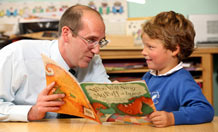
School teacher reading to school pupil.
Education under the microscope at major international event
International education experts from 40 different countries will be meeting at the largest educational conference of its kind in Europe.
The European Association for Research on Learning and Instruction (EARLI) will be holding its 14th biennial conference at the University of Exeter from the 30 August to 3 September.
The conference will showcase the latest research in education and cognitive psychology, including showing how neuroscience is changing how we think about learning.
The theme is Education for a Global Networked Society and in keeping with the title, a virtual online conference has been set up to enable and encourage debate across a broader spectrum of researchers and is open to anyone who may benefit from educational discussion.
Distinguished UK education experts Professor Mary James and Professor Andrew Pollard, who are currently re-writing the UK national curriculum, will speak about how the Teaching and Learning Research Programme (TLRP) TLRP’s ten principles have informed understanding of teaching, learning and being a teacher. The evidence and reasoning underpinning the ten principles has not previously been fully explained. A special issue of Research Papers in Education will be launched at the EARLI 2011 conference, outlining the TLRP principles and providing an international response.
The Deputy Editor of the Research Papers in Education is Professor Debra Myhill, Associate Dean for Research in the College of Social Sciences and International Studies at the University of Exeter. She said: “Research Papers in Education is an international journal hosted at the University of Exeter, and is currently rated as one of the UK’s top education journals. The EARLI conference is a major contribution to understanding teaching and learning, and hosting it at Exeter recognises the Graduate School of Education’s reputation as internationally excellent in research and teacher education. The just published Good Teacher Training Guide 2011 sees the Graduate School of Education challenging Oxford and Cambridge for the top slots, with primary PGCE rated as the best in the country.”
Keynote speaker Professor Stanislas Dehaene, a cognitive neuroscientist from the College of France will look at the relevance of brain imaging. Professor Dehaene will explain how a child’s brain works and how it is changed by schooling. Through this neuroscience process he is identifying how learning to read literally transforms a child, which may have huge implications for teaching.
Transforming the way school children work together forms part of the new research of the Director of Research at the University of Exeter’s Graduate School for Education, Professor Rupert Wegerif. He is leading a major international project to improve the engagement and attainment of pupils within the science curriculum using the visual language of a web 2.0 gaming platform. Secondary school students are exploring science challenges with classmates using this platform integrated with argumentation tools and 3-D environments. The aim is to help school students learn how to learn together in groups online. This is the sort of new skill that many see as valuable for thriving in the emerging knowledge age.
The University of Exeter’s involvement with cognitive education is well established as one of the first UK institution of Higher Education to make links with the Feuerstein Research Centre in Jerusalem, leaders in cognitive theory. The University’s Cognitive Education Centre also introduced the notion of Dynamic Assessment, which is the gap between what the child can learn unaided, and what he or she can learn with the help of an adult to educational psychologists in the UK.
More recently, developments in education have led to the establishment of ‘Thinking Schools’ that involve both students and staff in learning how to think reflectively, critically and creatively, and to use these techniques in developing a curriculum and associated activities. The University’s Graduate School of Education has been instrumental in helping schools to make contact with training agencies, carrying out evaluations of their effectiveness and offering formal recognition and status of being a Thinking School.
Junior researchers will have the opportunity to attend the JURE pre-conference: a conference organised by and for EARLI’s Junior Researchers, which aims to provide an occasion to share research concerns with peers and more experienced senior researchers.
Date: 23 August 2011
